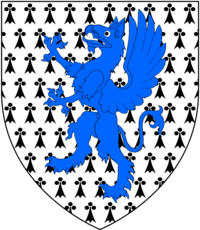Francis Aungier, 1st Baron Aungier of Longford facts for kids
Quick facts for kids
The Lord Aungier of Longford
|
|
|---|---|

Arms of Aungier: Ermine, a griffin segreant azure
|
|
| Master of the Rolls in Ireland | |
| In office 1609 – aft. 1625 |
|
| Monarch | James I, Charles I |
| Member of House of Lords | |
| In office 1614–1614 |
|
| Justice of Assize | |
| Personal details | |
| Born |
Francis Aungier
1558 Cambridge, England |
| Died | 1632 Dublin, Ireland |
| Occupation | judge |
| Profession | lawyer |
Francis Aungier, 1st Baron Aungier of Longford (1558–1632) was an important English lawyer and judge. He became a powerful figure in Ireland during the reigns of King James I and King Charles I. He was known as the Master of the Rolls in Ireland, a high legal position. He also became a member of the House of Lords, which is part of the British Parliament.
Contents
Early Life and Education
Francis Aungier was born in 1558 in Cambridge, England. His father, Richard Aungier, was also a lawyer and owned a lot of land. Francis followed in his father's footsteps.
He went to Westminster School and then to Trinity College, Cambridge. After college, he joined Gray's Inn in 1577. Gray's Inn was a place where lawyers were trained. Francis was a very talented lawyer, even earning praise from the famous philosopher and statesman Francis Bacon.
A Career in Law and Politics
In the 1590s, Francis Aungier settled in East Clandon, Surrey. He became friends with important people there. His career took a big step forward in 1609. King James I appointed him to the Irish Privy Council. This council advised the King on matters in Ireland.
That same year, King James I also made him the Master of the Rolls in Ireland. This was a very important job in the legal system. It meant he was in charge of keeping legal records and documents. The King also made him a knight, giving him the title "Sir."
Important Roles in Ireland
Francis Aungier continued to serve under King Charles I. He was re-appointed as Master of the Rolls in 1625. He also played a role in the House of Lords in 1614.
He helped with the "Plantation" efforts in Ireland. This was a plan to settle English and Scottish people on Irish land. He was a commissioner for the Plantation of Munster in 1616 and County Longford in 1620. In 1619, he also helped manage the Great Seal of Ireland, which was used to make official documents.
In 1621, Francis Aungier was given the title of Lord Aungier, Baron of Longford. This made him a peer, a member of the nobility. He bought land in Dublin where a monastery used to be. Later, in 1677, a street in Dublin called Aungier Street was named after his family.
Family Life
Francis Aungier was married three times and had several children. His children continued his family line.
His first marriage was to a woman from the Fitzgerald family. They had five children together. One of his sons, Ambrose Aungier, became a church official. Ambrose was the father of Francis Aungier, 1st Earl of Longford, who became a very important figure later on.
Francis Aungier's second wife was Anne Barne. They had two children. His third wife was Margaret Cave, but they did not have any children.
 | Aurelia Browder |
 | Nannie Helen Burroughs |
 | Michelle Alexander |

